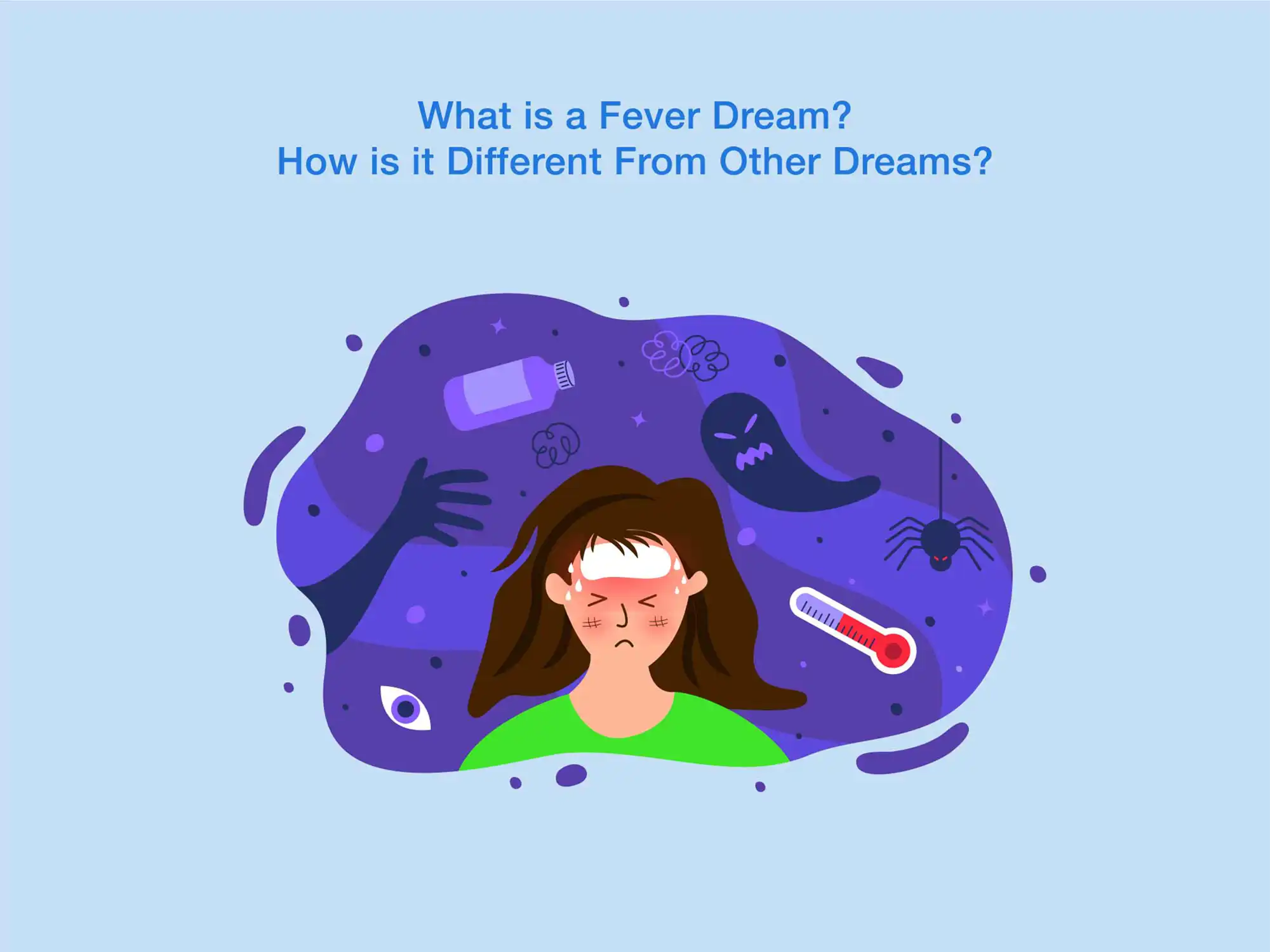Sleep Health
Published March 3, 2023
11 minWhat is a Fever Dream? How is it Different From Other Dreams?
Ever wondered how do dreams work? Dreams typically have associations with mood and intense feelings experienced when awake. However, there are many different kinds of dreams, including regular dreams,

Table of contents
What Is A Fever Dream What Happens During A Fever Dream Do Fever Dreams Have A Meaning How To Prevent Fever DreamsHow Are Fever Dreams Different From Other Dreams Conclusion Frequently Asked Questions
Ever wondered how do dreams work? Dreams typically have associations with mood and intense feelings experienced when awake. However, there are many different kinds of dreams, including regular dreams, daydreams, lucid dreams, nightmares, etc. Fever dreams, however, are the strangest.While some fever dreams are related to teenage memories, others are just strange one-time occurrences. No matter where they come from, fever dreams can be frightening and unpredictable.But what is a fever dream? Read this article as we talk about fever dream meaning, its causes, prevention, and a lot more about fever dreams to help you answer questions like what causes dreams”, “why do I dream so much,” and “how to stop fever dreams.”
Not sure which mattress fits you best? Find out now.
What Is A Fever Dream
A fever dream is a nighttime dream that usually has unpleasant connotations and is brought on by a rise in body temperature. Adults' normal body temperatures range from 97 to 99 °F. Fever is defined as a temperature of 100°F or more.Fever dreams are described as disturbing, depressing, unpleasant, and weird dreams that a person has while experiencing an episode of fever. In addition, fever dreams typically have strong symptoms like vertigo or difficulty breathing.When Do They Occur
Fever dreams only occur when you are sick or have a high body temperature. Your body might develop a fever because of the following:- Viral or bacterial infection
- Certain inflammatory conditions, like rheumatoid arthritis
- Heat exhaustion
- Due to medication like antibiotics
- Or a tumor
What Happens During A Fever Dream
A person is more susceptible to negative thoughts when sick or has fever since these conditions heighten emotional instability and increase sensitivity. As all fever dreams are vivid and often disturbing, they cause people to encounter more strange or terrifying circumstances.The arms and legs are paralyzed and unable to act or react to these depressing and bizarre dreams. Even so, the individual can still awaken startled, and uneasy.According to Bruce Ames and his research collaborators, 11% of participants out of 28 reported having bizarre and unusual dreams that went "back and forth between really terrible situations and a very comfortable circumstance" while they had a fever.An unpleasant childhood memory is also said to appear in fever dreams, or they may just be recurrent dreams that occur anytime a person has a fever. The most typical fever dream scenarios involve stressful situations when dreamers feel scared by fearful circumstances that are also overwhelming in reality.Do Fever Dreams Have A Meaning
Although fever dreams are meaningless, they frequently reflect the dreamer's conditions or emotions. According to Michael Schredle's research, fever symptoms and imagery associated with them frequently appear in fever dreams. Other prevalent themes in fever dreams include spatial distortion, such as moving walls and monsters with extended arms and legs.Although the purpose of these vivid dreams is unknown, Schredle hypothesizes that it may be related to the brain's sensation of heat during fever. Yet, the significance and goal of fever dreams are still unknown.How To Prevent Fever Dreams
For some people, fever dreams may not be a major concern. However, some might be triggered by them. These may be even more distressing for children as they may have more vivid dreams. While there is no single way to stop or prevent fever dreams, getting rid of the fever can lessen their likelihood.- Stay hydrated.
- Get enough sleep. Many health advantages of sleep include aiding in the body's healing after an illness.
- Take medicines as directed by your doctor.
- If your symptoms intensify, ensure to see your doctor.
- Consuming mild, easily-digestible foods.
- Do not worry about your nightmares; instead, remain cool and get plenty of rest.
- Showering in lukewarm water could help you relax.
- Eat well and frequently wash your hands.
- Many health advantages of getting enough sleep also include quick recovery.
- Maintaining a clean and organized atmosphere will promote calm thoughts.
- The nose and throat irritation can be avoided by maintaining a humid environment; utilizing a humidifier.
How Are Fever Dreams Different From Other Dreams
Fever dreams differ from other types of dreams because the intensely high temperature experienced during febrile episodes affects the brain's cognitive process, causing the brain to be unable to function normally, resulting in fever dreams that are more vivid and abnormally distressing than other types of dreams. They are also more damaging than other dreams and contain fewer happy occurrences.In addition, there are fewer verbal and physical interactions and fewer dream characters or figures in fever dreams. Fever dreams, however, end as the temperature returns to normal.Furthermore, there's sleep disruption because fever is more likely to produce other sleep-related issues such as insomnia, episodes of sleepwalking, or dreadful dreams. Fever dreams become more viable and frequent as a result of this.Particular characteristics of fever dreams include:Spatial Distortion
According to Schredl's (2003) and Domhoff's (2003) study report, moving walls and space changing size are typical examples of fever dreams. Negative dream emotions are associated with poor daytime mood, and bizarreness is related to cognitive deficiencies.Threats
Again, Schredl's (2016) study found that participants reported threats because fever dreams frequently represent wake-life events, fears, and thoughts like dogs, large spheres, insects, and terrorists.Illness
Dreams can vary greatly depending on the individual, with some people dreaming about illnesses, including respiratory trouble, pain, and vertigo.Let us now see how fever dreams differ from lucid dreams and nightmares.Fever Dreams vs. Lucid Dreams
Lucid dreams are unique. Lucid dreams have been reported by people who claim to be able to influence their dream narratives. Therapists employ lucid dreams as a tool to assist their patients in overcoming fears and manifesting their ideal results.In contrast to fever dreams, lucid dreaming is not correlated with body temperature. They don't always feel bad and aren't always unpleasant, but they do have similar symptoms.They both happen during REM sleep, are incredibly vivid, and have a high recall value despite this.Among the things that can cause lucid dreams are:Mnemonic Induction of Lucid Dreams
For research objectives, individuals are awakened using the MILD method to create lucid dreams after five to six hours of sleep. After awakening, the subjects were instructed to practice MILD or a control task, such as reading. They would then go back to bed for a morning nap.A Reality Check
A person who is sleeping questions whether they are awake or not. Being able to respond also establishes the lucidity of the dreams, as it is challenging to do so in non-lucid dreams.External Stimulation
In this aspect, bright lights or loud noises stimulate the senses while asleep, causing their dreams to become more vivid without rousing them.Fever Dreams vs. Nightmares
Are fever and nightmares connected? While anxiety and stress might be the root cause of nightmares, fever dreams are the effects of fever. Moreover, nightmares can be a sign of sleep disturbance because they interfere with sleep when a person has gone through problems like:- Reoccurring nightmares
- Distress or cognitive impairment during the day, such as worry or fear of nightmares before bed
- Issues with memory or focus
- Considering or frequently recalling a certain incident or vision from the nightmare.
- Feeling weak and worn out throughout the day
- Inability to focus at work or school or socialize
- Behavioral problems with going to bed or a fear of the dark











